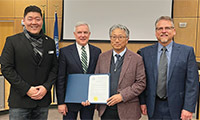In reality, life is not so simple. Subtler forms of discrimination, some of them based on appearance and attractiveness, persist even where overt prejudice, against race or religion, is deplored.
Just ask an overweight person. Many of them feel that the ridicule they endure is more painful because it is socially acceptable. Research shows that while more people are overweight than ever, the stigma against them is intensifying. And as The Times reported, obesity is often attacked as a personal failing, even though science mostly points to genetics.
Meanwhile, fat people are blamed for issues like higher healthcare costs and even increased fuel consumption that contributes to global warming. Many complain that being overweight affects their job prospects.
“We’re kind of a popular punching bag,” Marilyn Wann, the author of “Fat? So!” told The Times. “You can do incredibly discriminating, hurtful, hateful things to fat people in public and not only get away with it but be seen as some kind of superhero.”
She added, “The only thing anyone can accurately diagnose by looking at a fat person is their own level of stereotype and prejudice about fat.”
Ageism is another subtle form of discrimination, particularly in Hollywood, where youth and beauty reign supreme. This year a group of older television writers won a $70 million age-discrimination lawsuit. But Tony Segall, general counsel for the Writers Guild, West, warned that “there is still a sharp decline in employment rates as writers get older.”
Others try to stop the clock with cosmetic surgery, to the point where, in some societies, women feel stigmatized if they don’t go under the knife.
“Women have always been under pressure to look good,” Susan Burke, 50, a nurse in New Jersey who has debated over having cosmetic surgery, told The Times. “But that has increased recently because we have become so used to seeing perfect, unwrinkled faces. Now when you see someone who looks like a raisin or a prune, it seems so unusual that you are almost repulsed.”
Part of the pressure is economic. “If you want to sell a million-dollar house, you have to look good,” Tracey McCallum, a real estate broker in Bowie, Maryland, told The Times. Ms. McCallum is only 33 but has already had Botox injections, chemical peels and laser treatments.
Some might say she is paranoid. But as The Times’s Maureen Dowd wrote, studies show that good-looking people get a “beauty premium” of 5 percent in wages per hour, contrasted with a “plainness penalty” of 9 percent.
Cigarette smokers are growing accustomed to their near-pariah status and for the most part have accepted that their habit is unwelcome in offices, bars and restaurants as smoking bans are enacted across the United States and in many European nations. In Belmont, California, however, some were angered when the city banned smoking virtually everywhere, including inside apartment buildings.
At least from the perspective of Edith Frederickson, a smoker for more than 50 years, the law was discriminatory. “They’re telling you how to live and what to do,” she told The Times last year, “and they’re doing it right here in America.” Unrepentant, she vowed to continue smoking at home. “I’m going to keep being a criminal, let me tell you that,” she said.
KEVIN DELANEY
스마터리빙
more [ 건강]
[ 건강]이제 혈관 건강도 챙기자!
[현대해운]우리 눈에 보이지 않기 때문에 혈관 건강을 챙기는 것은 결코 쉽지 않은데요. 여러분은 혈관 건강을 유지하기 위해 어떤 노력을 하시나요?
 [ 건강]
[ 건강]내 몸이 건강해지는 과일궁합
 [ 라이프]
[ 라이프]벌레야 물럿거라! 천연 해충제 만들기
 [ 건강]
[ 건강]혈압 낮추는데 좋은 식품
[현대해운]혈관 건강은 주로 노화가 진행되면서 지켜야 할 문제라고 인식되어 왔습니다. 최근 생활 패턴과 식생활의 변화로 혈관의 노화 진행이 빨라지고
사람·사람들
more
[한인단체 신년 인터뷰] LA 평통 장병우 회장… “본연 역할로 한반도 평화 실질 기여”
민주평화통일자문회의 LA협의회(이하 LA 평통) 장병우 회장은 6일 본보와의 신년 인터뷰에서 붉은 말의 해인 병오년 새해를 맞아 신년 화두로 …

워싱턴주에 첫 한인 시의장
워싱턴주에서 첫 한인 시의회 의장이 탄생했다. 제이슨 문(한국명 문태원) 머킬티오 시의원이 새해 들어 시의장으로 선출되며 또 하나의 중책을 맡…
국회 방문단 대한인국민회 방문
윤후덕·이해식·김한규 의원과 조오섭 국회의장 비서실장 등 10여 명의 한국 국회방문단이 지난 5일 LA를 찾아 로즈데일 묘지와 국민회관 등 미…
[한인단체 신년 인터뷰] 명원식 파바월드 회장… …
“한인 차세대들이 바르게 자랄 수 있는 토대를 만드는 것이 제가 파바월드의 회장으로 존재하는 유일한 이유입니다”한인사회의 대표적 청소년 봉사 …
LA한인회 멘토 프로그램 10일 스티브 강 위원장
LA 한인회(회장 로버트 안)가 한인사회 차세대 인재양성 노력의 하나로 ‘멘토를 만나다’ 프로그램을 정례화해 실시하고 있는 가운데 그 세 번째…
많이 본 기사
- 머스크, 韓인구절벽 또 경고… “북한군 그냥 걸어 넘어오면 돼”
- 이민단속국 총격 여성 사망에 시위 확산…충돌·긴장 고조
- 부통령 “유럽, 그린란드 관련 트럼프 진지하게 받아들여야”
- 한국계 美의원들 “한국계 미국인의 유산·전통이 바로 美가치”
- 구글 공동창업자도 오라클 회장도…탈캘리포니아?
- 연예계 은퇴합니다..돌연 충격 선언한 조윤우·소희·이태임
- 덴마크·그린란드, 美 ‘그린란드 회담’ 수락에 “환영”
- 트럼프, ‘美 베네수 운영 관여 1년 넘나’ 묻자 “훨씬 더 길 것”
- “공업용 실리콘을 얼굴에”..故 선풍기 아줌마, 충격적인 성형 부작용[꼬꼬무]
- ICE 요원 총격… 시민권자 여성 사… 5
- 유엔, 올해 세계경제 성장률 2.7% 전망…한국은 1.8%로 예상
- 젤렌스키 “美 우크라 안전보장안, 트럼프 결정만 남아”
- 내란특검, 尹 구형 숙고 6시간 ‘마라톤 회의’…키는 조은석 손에
- 美각료 “美의 베네수 제재위반 배 나포 보며 北 무슨 생각할까”
- 초강경 이민단속, 아시아계도 큰 타격 3
- 트럼프 관세에 美 무역적자 16년만에 최소…의약품 수입 금감
- 탁재훈·신정환, 드디어 컨츄리꼬꼬 재회.. “또 잡힌 겁니까?”[노빠꾸]
- 시애틀~인천노선운항 항공사 1개 줄듯...국토교통부 대한항공 대체항공사로 알래스카항공 최종 결정
- 브로드웨이 뮤지컬 공연을 반값에…
- [스키 기고] 초보자의 수난과 고수의 허세
- 케빈 김 주한 미 대사대리 전격 이임
- ‘오타니·야마모토’ 때문에 日 못 뚫는 SF, ‘이정후 파워’로 한국 개척 나선다... 일본도 주목 중
- 美, ‘외국산 드론·부품 수입 금지’ 예외 허용…삼성 제품 포함
- 컴퓨터 전공·로스쿨 졸업생들도‘취업난’극심
- ‘데이트 폭력 폭로’ 재키와이, 돌연 입 열었다 “흉기·스토킹 NO”
- ‘美 정복’ 손흥민, 케인·메시·음바페와 어깨 나란히... ‘올해의 팀’ 공격수 부문 후보 등극
- 美, 인천에 본부 둔 녹색기후기금 탈퇴… “자금지원 안해”
- 이주자 텍사스 몰린다 가주는 유입자 최하위
- ICE Agent Shooting Sparks Outrage: U.S. Citizen Woman Killed
- 초강경 이민단속, 아시안 커뮤니티도 큰 타격
- D-SNP 한인 가입자들, 그로서리 혜택 놓친다
- “모든 소송 철회하고 내분사태 원만히 해결하길”
- [독자 투고] 땅 끝 마을 파타고니아… 2
- 유엔기후협약, 美 탈퇴에 “자책골…재가입문 열려있어”
- 마크롱 “美, 일부 동맹국에 등 돌리고 국제규범서 벗어나”
- [발언대] L.A. 갈비의 유래
- 軍권력기관 방첩사, 계엄 여파로 49년 만에 역사 속으로
- 팰팍 타운 77만달러 적자 놓고 정치권‘충돌’
- 뉴욕증시, 시총 4조달러 눈앞에 둔 알파벳…혼조 마감
- 韓 여야, 이혜훈 청문회 19일 하루 잠정 합의… “충분히 질의”
- 부고-박철환 씨 별세
- “주택 부족, 워싱턴 경제 위험 초래”
- 치매 예방효과 탁월한 활동은 ‘춤’…… 1
- 42억 횡령→징역형 집유 받았는데도..황정음 소속사 여전히 미등록
- 미니애폴리스서 30대 여성, 이민단속요원 총격에 사망
- 뉴욕 등 5개주 연방아동보육예산 지원 전격 중단
- 가주 등 5개주 연방 아동보육 예산 전격 동결
- 李대통령 “에너지 문제로 국제 혼란…에너지대전환 잘 준비해야”
- 제5대 회장에 김길영 회장 연임
- MD 몽고메리서 음주운전자 140여명 적발
1/5지식톡

-
 미 육군 사관학교 West Poin…
0
미 육군 사관학교 West Poin…
0https://youtu.be/SxD8cEhNV6Q연락처:wpkapca@gmail.comJohn Choi: 714-716-6414West Point 합격증을 받으셨나요?미 육군사관학교 West Point 학부모 모…
-
 ☝️해외에서도 가능한 한국어 선생님…
0
☝️해외에서도 가능한 한국어 선생님…
0이 영상 하나면 충분합니다!♥️상담신청문의♥️☝️ 문의 폭주로 '선착순 상담'만 진행합니다.☎️ : 02-6213-9094✨카카오톡ID : @GOODEDU77 (@골뱅이 꼭 붙여주셔야합니다…
-
 테슬라 자동차 시트커버 장착
0
테슬라 자동차 시트커버 장착
0테슬라 시트커버, 사놓고 아직 못 씌우셨죠?장착이 생각보다 쉽지 않습니다.20년 경력 전문가에게 맡기세요 — 깔끔하고 딱 맞게 장착해드립니다!장착비용:앞좌석: $40뒷좌석: $60앞·뒷좌석 …
-
 식당용 부탄가스
0
식당용 부탄가스
0식당용 부탄가스 홀세일 합니다 로스앤젤레스 다운타운 픽업 가능 안녕 하세요?강아지 & 고양이 모든 애완동물 / 반려동물 식품 & 모든 애완동물/반려동물 관련 제품들 전문적으로 홀세일/취급하는 회사 입니다 100% …
-
 ACSL 국제 컴퓨터 과학 대회, …
0
ACSL 국제 컴퓨터 과학 대회, …
0웹사이트 : www.eduspot.co.kr 카카오톡 상담하기 : https://pf.kakao.com/_BEQWxb블로그 : https://blog.naver.com/eduspotmain안녕하세요, 에듀스팟입니다…
케이타운 1번가
오피니언
 이상희 UC 리버사이드 교수 인류학
이상희 UC 리버사이드 교수 인류학 오렌지 상자와 함께하는 2026년
 오세정 서울대 물리천문학부 명예교수·전 총장
오세정 서울대 물리천문학부 명예교수·전 총장 [오세정 칼럼] 병오년 새해, 한국의 과제
 존 안 / LA 거주
존 안 / LA 거주 [독자 투고] 땅 끝 마을 파타고니아 여행 유감
 이리나 수필가
이리나 수필가 [윌셔에서] 레디 코어(Ready Core)의 해를 맞으며
 이영창 / 한국일보 논설위원
이영창 / 한국일보 논설위원 [지평선] 67년생 현역 축구선수 미우라

[왈가 왈부] “이혜훈 청문회까지 지켜봐야”… 국민 눈높이에 맞나요
 정숙희 논설위원
정숙희 논설위원케네디에 관한 네 개의 이야기
 마크 A. 시쎈 / 워싱턴포스트 칼럼니스트
마크 A. 시쎈 / 워싱턴포스트 칼럼니스트 [마크 A. 시쎈 칼럼] 트럼프의 20가지 업적
 김동찬 시민참여센터 대표
김동찬 시민참여센터 대표 [미국은 지금] 2026년 ‘손님’ 의식 버리고 ‘주인’ 입장을
1/3지사별 뉴스

팰팍 타운 77만달러 적자 놓고 정치권‘충돌’
뉴저지 팰리세이즈팍 타운정부가 지난해 77만5,000달러 재정적자가 발생한 것을 두고 정치권이 강하게 충돌하면서 지역 한인사회가 술렁이고 있다…
뉴욕 등 5개주 연방아동보육예산 지원 전격 중단

‘연방 하원 민주·상원 공화’가능성 커
올해 11월3일 미 전역에서 중간선거가 실시된다. 이번 선거에서는 연방 하원 전체 435석과 함께 연방 상원 100석 가운데 35석을 새로 선…
“주택 부족, 워싱턴 경제 위험 초래”

베네수 이어 그린란드…트럼프, 2년차 벽두부터 美우선주의 거친 질주
2026년 새해 벽두부터 도널드 트럼프 대통령의 행보가 심상치 않다.집권 2기 2년차를 맞아 자신과 지지층의 이념이라 할 ‘미국 우선주의’ 구…
중부 캘리포니아 ‘한인 이민사’ 나왔다




















































.png)


댓글 안에 당신의 성숙함도 담아 주세요.
'오늘의 한마디'는 기사에 대하여 자신의 생각을 말하고 남의 생각을 들으며 서로 다양한 의견을 나누는 공간입니다. 그러나 간혹 불건전한 내용을 올리시는 분들이 계셔서 건전한 인터넷문화 정착을 위해 아래와 같은 운영원칙을 적용합니다.
자체 모니터링을 통해 아래에 해당하는 내용이 포함된 댓글이 발견되면 예고없이 삭제 조치를 하겠습니다.
불건전한 댓글을 올리거나, 이름에 비속어 및 상대방의 불쾌감을 주는 단어를 사용, 유명인 또는 특정 일반인을 사칭하는 경우 이용에 대한 차단 제재를 받을 수 있습니다. 차단될 경우, 일주일간 댓글을 달수 없게 됩니다.
명예훼손, 개인정보 유출, 욕설 등 법률에 위반되는 댓글은 관계 법령에 의거 민형사상 처벌을 받을 수 있으니 이용에 주의를 부탁드립니다.
Close
x